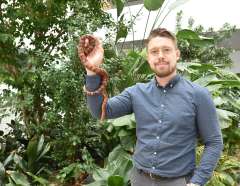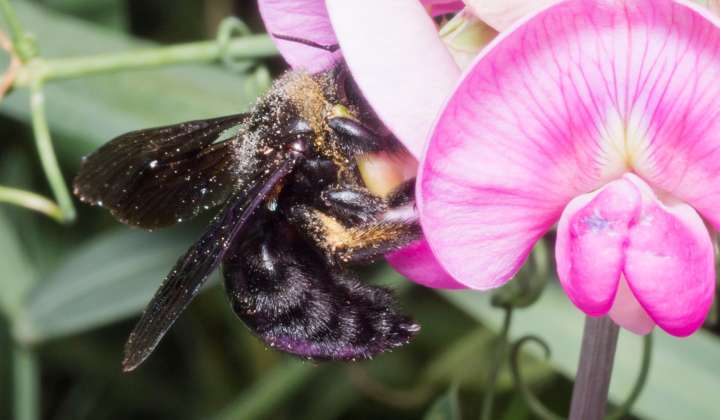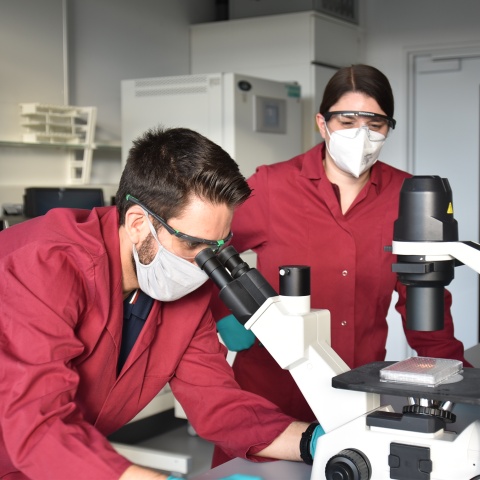Giessen venom researcher meets Nobel Laureates
He has received one of the coveted invitations to the 72nd Lindau Nobel Laureate Meetings from 25 to 30 June 2023: Natural products researcher Dr. Tim Lüddecke from the Fraunhofer Institute for Molecular Biology and Applied Ecology (IME) and the LOEWE Centre for Translational Biodiversity Genomics (TBG) in Hesse, Germany.
It is an event with tradition that inspires young scientists anew every year: since 1953, outstanding young researchers have met Nobel Prize winners, the so-called Laureates, at the Lindau Nobel Laureate Meetings. The meetings in the small Bavarian town of Lindau on Lake Constance serve intellectual exchange and rotate thematically between the Nobel Prize disciplines of physics, chemistry and – as this year – physiology and medicine. The multi-stage selection process for participation is international and highly competitive; a total of 635 young scientists were invited to exchange ideas with the Laureates. After this unique experience, the participants remain connected within the Lindau Alumni Network for a lifetime.
Joining them in 2023 is Dr. Tim Lüddecke, leader of the “Animal Venomics” junior research group at the Bioresources Department of the Fraunhofer Institute for Molecular Biology and Applied Ecology IME. He is also a lecturer at the Institute for Insect Biotechnology at Justus Liebig University Giessen and a member of the LOEWE Centre for Translational Biodiversity Genomics, where he is the programme area spokesperson for Natural Product Genomics.
Lüddecke conducts research in the field of biology and biochemistry and analyses possible forms of application of animal toxins, especially of arthropods such as insects and spiders. Thereby, he identifies and characterises previously unknown natural products using methods of systems biology and biotechnology. The applied aspect of his research is particularly important to him, be it for plant protection, industrial goods production, or biomedicine. Together with other LOEWE-TBG researchers, Lüddecke has already succeeded in isolating new biomolecules from the venoms of spiders, ants, or bees with efficacy against (multi-resistant) pathogens or breast cancer. “I am very much looking forward to the professional dialogue with the Nobel laureates and the lifelong networking with other young researchers in physiology and medicine within the Lindau Alumni Network,” Lüddecke says. “It is a great honour for me that the selection committee has considered my application and invited me to the 72nd Lindau Meeting”.
About the Lindau Nobel Laureate Meetings
Since their foundation in 1951, the Lindau Nobel Laureate Meetings have developed into a unique international scientific forum. The annual conferences serve to promote exchange between different generations, cultures, and disciplines.
Thus, the conferences are dedicated alternately to the three Nobel Prize-winning scientific disciplines, physics, chemistry or physiology and medicine. An interdisciplinary conference is held every five years and the Lindau Conference of Economic Sciences every three years. Within the framework of various declarations (2020 for open sciences, 2015 on climate change, 1955 against the use of nuclear weapons), the scientists repeatedly contributed to the public debate with political appeals.
It was the Lindau doctors Franz Karl Hein and Gustav Wilhelm Parade who approached Lennart Graf Bernadotte af Wisborg with the idea of a conference with Nobel laureates, which they implemented together with him – including young scientists since 1953. Around 35,000 students, doctoral candidates and post-doctoral researchers have taken part since then.
Even if the conference was a unique experience for them in the truest sense of the word, they remain permanent members of the Lindau Alumni Network, networked with each other and are ambassadors of scientific dialogue.
Throughout the year, the Lindau Nobel Laureate Meetings are committed to highlighting the importance of the knowledge society and advocating for science and research with their “Mission Education”. The Lindau Media Library also serves this goal as a learning platform, including teaching materials for schools.
More informations:
https://www.lindau-nobel.org/de/current-meeting/
https://www.mediatheque.lindau-nobel.org/meetings/2023/programme



